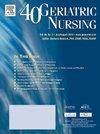A pathway analysis of the role of factors influencing oral frailty in community-dwelling older adults: structural equation modeling
IF 2.5
3区 医学
Q3 GERIATRICS & GERONTOLOGY
引用次数: 0
Abstract
The aim of this study was to construct a structural equation model to explore the pathways of oral health knowledge, beliefs, and behaviors on oral frailty. This study collected data from February 01 to May 31, 2024, using the general information questionnaire, oral health knowledge, belief and behavior scale, revised oral assessment guide, and oral frailty index-8 scale. The results of the study reveal that the prevalence of oral frailty was 59%, oral frailty was negatively associated with oral health knowledge, beliefs, and behaviors, and positively associated with the number of teeth lost and oral health status score. Oral health knowledge and beliefs can influence oral frailty through oral health behaviors, as well as the number of teeth lost and oral health status and thus oral frailty through oral health behaviors. Together, the variables explained 74% of the total variance in oral frailty. Oral health behavior is a key factor in the pathway of this study, and improving oral health knowledge and beliefs in older adults can help change their oral health behaviors and reduce the risk of oral frailty.
社区老年人口腔虚弱影响因素的通路分析:结构方程模型
本研究旨在构建结构方程模型,探讨口腔健康知识、信念和行为对口腔脆弱的影响途径。本研究于2024年2月1日至5月31日收集数据,采用一般信息问卷、口腔健康知识、信念与行为量表、修订后的口腔评估指南、口腔脆弱指数-8量表。研究结果显示,口腔脆弱患病率为59%,口腔脆弱与口腔健康知识、信念和行为呈负相关,与牙齿脱落数和口腔健康状况评分呈正相关。口腔卫生知识和信念可以通过口腔卫生行为影响口腔脆弱,又可以通过口腔卫生行为影响牙齿脱落数量和口腔健康状况,进而影响口腔脆弱。总之,这些变量解释了口腔虚弱总方差的74%。口腔健康行为是本研究路径中的关键因素,提高老年人口腔健康知识和信念有助于改变其口腔健康行为,降低口腔脆弱的风险。
本文章由计算机程序翻译,如有差异,请以英文原文为准。
求助全文
约1分钟内获得全文
求助全文
来源期刊

Geriatric Nursing
医学-护理
CiteScore
3.80
自引率
7.40%
发文量
257
审稿时长
>12 weeks
期刊介绍:
Geriatric Nursing is a comprehensive source for clinical information and management advice relating to the care of older adults. The journal''s peer-reviewed articles report the latest developments in the management of acute and chronic disorders and provide practical advice on care of older adults across the long term continuum. Geriatric Nursing addresses current issues related to drugs, advance directives, staff development and management, legal issues, client and caregiver education, infection control, and other topics. The journal is written specifically for nurses and nurse practitioners who work with older adults in any care setting.
 求助内容:
求助内容: 应助结果提醒方式:
应助结果提醒方式:


